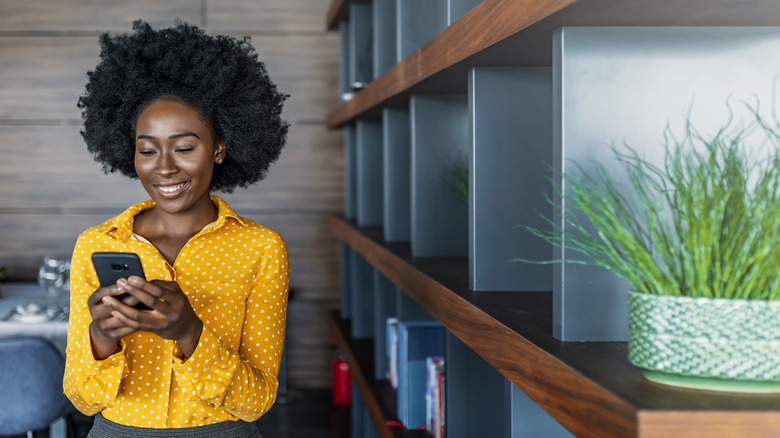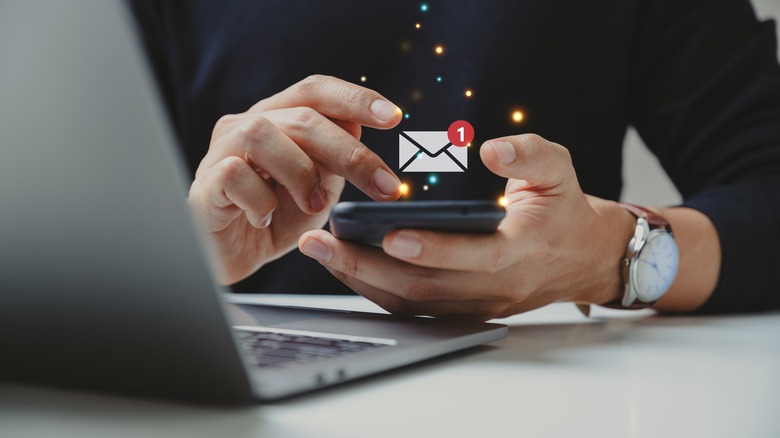How The 'Inbox Zero' Method Can Make Your Life Simpler
We may receive a commission on purchases made from links.
E-mails — or at least getting too many of them — can have a way of dampening your mood. When you see an inbox that's full of messages you have to respond to or tasks that need to be completed, your day can quickly start to feel overwhelming. Before you know it, you're spending precious minutes tackling an overflowing inbox rather than doing other work that requires your attention.
Perhaps this is why when blogger, podcaster, and productivity guru Merlin Mann came up with the concept of "inbox zero" in the early 2000s (inspired by ideas from David Allen's book "Getting Things Done"), fellow productivity enthusiasts quickly jumped on the bandwagon. Mann talked about how time and attention are finite, and how spending a few minutes getting your emails done and over with soon can make your professional life simpler. He advocated that you either delete/archive, delegate, respond, defer, or do what's required by the email (especially if it's something that wouldn't take much of your time). Those five actions could look different to you depending on your particular job role, but the idea was not to spend a lot of time on emails and to move on to something else when you're done.
Mann told GQ, "E-mail had become a source of stress for so many people. It was great that people could contact you. It was not great that everybody can contact you with anything, at any time, with any expectation." Although the term has the word "zero" in it, it isn't about clearing all your emails incessantly.
The 'inbox zero' method is not about hyper-focusing on an empty inbox
Mann's idea was about using technology to serve you and not the other way around. It was about getting emails out of the way before focusing on doing work that mattered. What ensued, however, in the years following his Google Tech Talk on the subject, was various productivity experts dishing out advice on how to label, organize, and tinker with your Gmail settings so that shortcuts automatically sent fresh emails into respective folders. Perhaps this is where apps that can help you organize your professional life were born.
While there's nothing wrong with labeling your messages, the hyper-focus on achieving an empty inbox at all times is where things lost meaning. Mann's idea of "inbox zero" is a lot less literal and a lot more philosophical. In an interview with Wired U.K., he shared, "Ask yourself. If I'm spending time and attention to so many different inboxes in so many places at so many times, is it any wonder that I'm very stressed out?"
When you don't set aside an allotted time daily to deal with your emails, what you find yourself doing, instead, is going to your inbox multiple times throughout the day. Your concentration is broken, you're invariably doing multiple things at the same time, and you're ultimately less efficient. As Mann told GQ, "Every minute you spend on something is time not spent on ten thousand other things."
'Inbox zero' can be applied to other areas of your life too
The idea behind "inbox zero" is to understand that we don't have an infinite number of hours in a day and we can only dedicate our time and attention toward a select few tasks, engagements, responsibilities, and roles in one day. Especially if any of those engagements are to be meaningful ones.
Mann explained to GQ, "I've come to think of it as more of a philosophy than a methodology ... It's a way of saying, 'Some people are allowed to have some of me, some of the time. Regardless of what the world demands of me, here's what I'm offering.'" And this can apply to all areas of your life — whether that be friends, family commitments, or work. With the "inbox zero" method, you're consciously admitting to yourself that you can't be everywhere at once. So whether this means you send one-liner email responses to messages that need your attention (that's better than no email at all) or you refuse to respond to WhatsApp messages from friends after a certain hour of the day, then so be it. You're protecting your mental health and peace of mind by making things simpler.
The world is full of productivity methods (think the "80/20 Audit" that can improve your life), but the "inbox zero" method is a lot more than a productivity hack. It's about protecting your time and using it mindfully and meaningfully.


